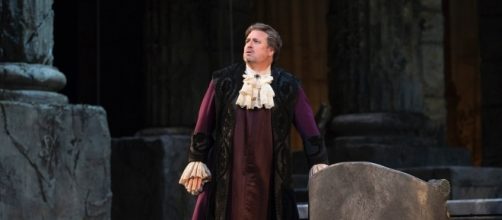Metropolitan Opera’s beloved Music Director Emeritus James Levine rightly dotes on “Idomeneo, re di Creta” (Idomeneus, King of Crete). Wolfgang Amadeus Mozart’s 12th of 21 operas uniquely features three tenors, three sopranos and a bass. But way back in 1781 the 25-year-old composer must have had Metropolitan Opera Chorus in mind when setting 11 choral numbers for the ingenious score—some just seconds long, others massive set pieces. Friday, March 17, Matthew Polenzani triumphed in the title role, and sopranos Ying Fang, Alice Coote and the searing Elza van den Heever jangled and tangled in a precarious love triangle.
Operatic title role
American tenor Matthew Polenzani with elegant vocalism and luxuriant lyrical legato gives a persuasive portrayal in this psychologically charged drama about the conflicted king who unwittingly swears to slay his own son, Prince Idamante. His specialty—passages sung as whispers that manage to reach the back row—he brandishes as if a sword and with it cuts straight to audience members’ hearts and deeply stirs the emotions.
Opera’s tangled web
Though from enemy lands, Ilia and Idamante seem made for each other, but Elettra wants him for herself. Ilia, a captive princess of steel-strength sweetness, claims Idomeneo as adoptive father, forgiving his having killed her own father, King Priam, in battle.
Likewise, she refuses to hold this against Idomeneo’s son. She is key to both men’s redemption. The trio of sopranos assembled for these roles is stupendous.
Opera’s unconventional convention
For opera newbies, Prince Idamante requires a vigorous suspension of disbelief. It’s a “trouser role,” played by a soprano made up as a man. Mozart wanted a particular vocal quality found nowhere in the male vocal range. A newcomer thus sees a “man” who sounds very much like a woman who woos one woman and flees from another. As Idamante, British mezzo-soprano Alice Coote is engaging. Her rich voice easily enfolds the intricate, mellifluous vocal line.
Opera’s most unfortunate woman
Poor Elettra! Things never go well for her in operas, whether Richard Strauss’ early success’ title character (“Elektra”) or here as Mozart’s scornful, spurned, archetypal villainess.
From a dysfunctional family, her stepfather killed her father, prompting her and her brother to murder their mother in revenge. From South Africa, the incandescent Elza van den Heever, the ever-regal Elettra, dispatches Act II’s aria and subsequent choral scene gently, with gorgeous legato phrasing and tender simplicity, but rages and roils to hair-raising effect in her ferocious Act I aria and in Act III’s royal tantrum and meltdown, with classic twitching and flinching added as a fine touch to her vocal explosion and physical collapse.
Opera’s full-fledged heroine
As Ilia, Chinese-born Ying Fang is a real-deal soprano, with full, blossoming lyricism, a cookies-and-cream voice and an authentic trill, which she fortunately gets to display abundantly in this role.
She shows savvy stage presence and acts with dramatic economy, even when not singing, appearing silently onstage during Elettra’s Act II aria and again in the ensuing trio, without upstaging her colleagues or drawing undue attention. The audience exuberantly rewarded her performance at curtain calls.
Metropolitan Opera’s fearless leader
The warmly applauded Maestro James Levine has conducted this opera 50 times at the Met. He deftly leads soloists and ensembles through sublimely lyrical and intensely dramatic passages. Metropolitan Opera Orchestra is at its best, from the rousing overture to the tiny details of the plush orchestrated recitatives. The mighty Metropolitan Opera Chorus runs the gamut of strength in aurally overwhelming numbers such as “Oh voto tremendo!” and the ethereal finesse of the hushed “Placido è il mar, andiamo” (Now that the sea’s calm, let’s embark).
“Idomeneo,” by Wolfgang Amadeus Mozart: two performances left; Metropolitan Opera, Lincoln Center for the Performing Arts, New York, N.Y.

